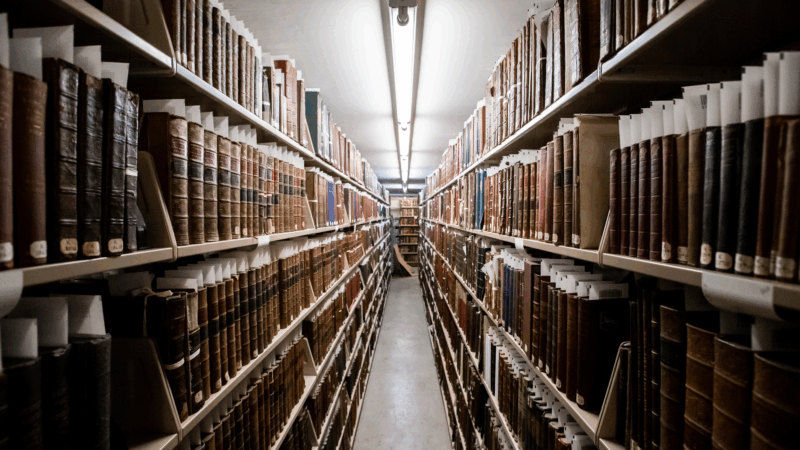Boston Public Library aims to increase access to a vast historic archive using AI
Boston Public Library, one of the oldest and largest public library systems in the country, is launching a project this summer with OpenAI and Harvard Law School to make its trove of historically significant government documents more accessible to the public.
The documents date back to the early 1800s and include oral histories, congressional reports and surveys of different industries and communities.
“It really is an incredible repository of primary source materials covering the whole history of the United States as it has been expressed through government publications,” said Jessica Chapel, the Boston Public Library’s chief of digital and online services.
Currently, members of the public who want to access these documents must show up in person. The project will enhance the metadata of each document and will enable users to search and cross-reference entire texts from anywhere in the world.
Chapel said Boston Public Library plans to digitize 5,000 documents by the end of the year, and if all goes well, grow the project from there.
Making a bargain with AI
Because of this historic collection’s massive size and fragility, getting to this goal is a daunting process. Every item has to be run through a scanner by hand. It takes about an hour to do 300-400 pages.

Harvard University said it could help. Researchers at the Harvard Law School Library’s Institutional Data Initiative are working with libraries, museums and archives on a number of fronts, including training new AI models to help libraries enhance the searchability of their collections.
AI companies help fund these efforts, and in return get to train their large language models on high-quality materials that are out of copyright and therefore less likely to lead to lawsuits. (Microsoft and OpenAI are among the many AI players targeted by recent copyright infringement lawsuits, in which plaintiffs such as authors claim the companies stole their works without permission.)
“Having information institutions like libraries involved in building a sustainable data ecosystem for AI is critical, because it not just improves the amount of data we have available, it improves the quality of the data and our understanding of what’s in it,” said Burton Davis, vice president of Microsoft’s intellectual property group.
Access for all
Greg Leppert, the Harvard Law School Library’s Institutional Data Initiative’s executive director, said it is not the goal of the initiative to grant AI companies privileged access to the rich troves of out-of-copyright information held at libraries and archives. Anyone can have access to the data after it’s been digitized.
“It’s a two-way street, where we are improving data in a way that will help AI, but those improvements work their way back into the library,” said Leppert. “So it improves the patron experience as well.”
OpenAI is helping Boston Public Library cover such costs as scanning and project management. The tech company does not have exclusive rights to the digitized data.
“We benefit, like others, from their efforts to digitize the public domain, expanding the high-quality data and public knowledge that AI systems, including ours, can build on,” the company said in a statement to NPR.
Challenges of public-private partnerships
Library professionals say working with AI companies will provide broader access to information.
“ I think this is a really worthwhile partnership out of which we are going to get more accessible collections,” Boston Public Library’s Chapel said.
And, because librarians are involved in curating and categorizing that information, the integrity of the materials used by AI companies can be more easily protected.
“Having trained professionals with deep subject knowledge is crucial in this moment as we start to develop what the future will bring,” said American Library Association President Sam Helmick.
But library experts also expressed caution about these partnerships because of the cultural differences between public institutions and corporations.
“The kind of ‘move fast and break things’ ethos of Silicon Valley is counter to the values of librarianship, which are about access and transparency,” said Michael Hanegan, co-author of the new book Generative AI and Libraries.
“This is all moving so fast: The technology is moving fast. The companies are moving fast,” Chapel said. “And libraries work on a very different timescale. So there’s a little bit of a culture clash.”
Jennifer Vanasco edited this story for broadcast and digital.
Homeland Security suspends TSA PreCheck and Global Entry airport security programs
The U.S. Department of Homeland Security is suspending the TSA PreCheck and Global Entry airport security programs as a partial government shutdown continues.
FCC calls for more ‘patriotic, pro-America’ programming in runup to 250th anniversary
The "Pledge America Campaign" urges broadcasters to focus on programming that highlights "the historic accomplishments of this great nation from our founding through the Trump Administration today."
NASA’s Artemis II lunar mission may not launch in March after all
NASA says an "interrupted flow" of helium to the rocket system could require a rollback to the Vehicle Assembly Building. If it happens, NASA says the launch to the moon would be delayed until April.
Mississippi health system shuts down clinics statewide after ransomware attack
The attack was launched on Thursday and prompted hospital officials to close all of its 35 clinics across the state.
Blizzard conditions and high winds forecast for NYC, East coast
The winter storm is expected to bring blizzard conditions and possibly up to 2 feet of snow in New York City.
Norway’s Johannes Klæbo is new Winter Olympics king
Johannes Klaebo won all six cross-country skiing events at this year's Winter Olympics, the surpassing Eric Heiden's five golds in 1980.







